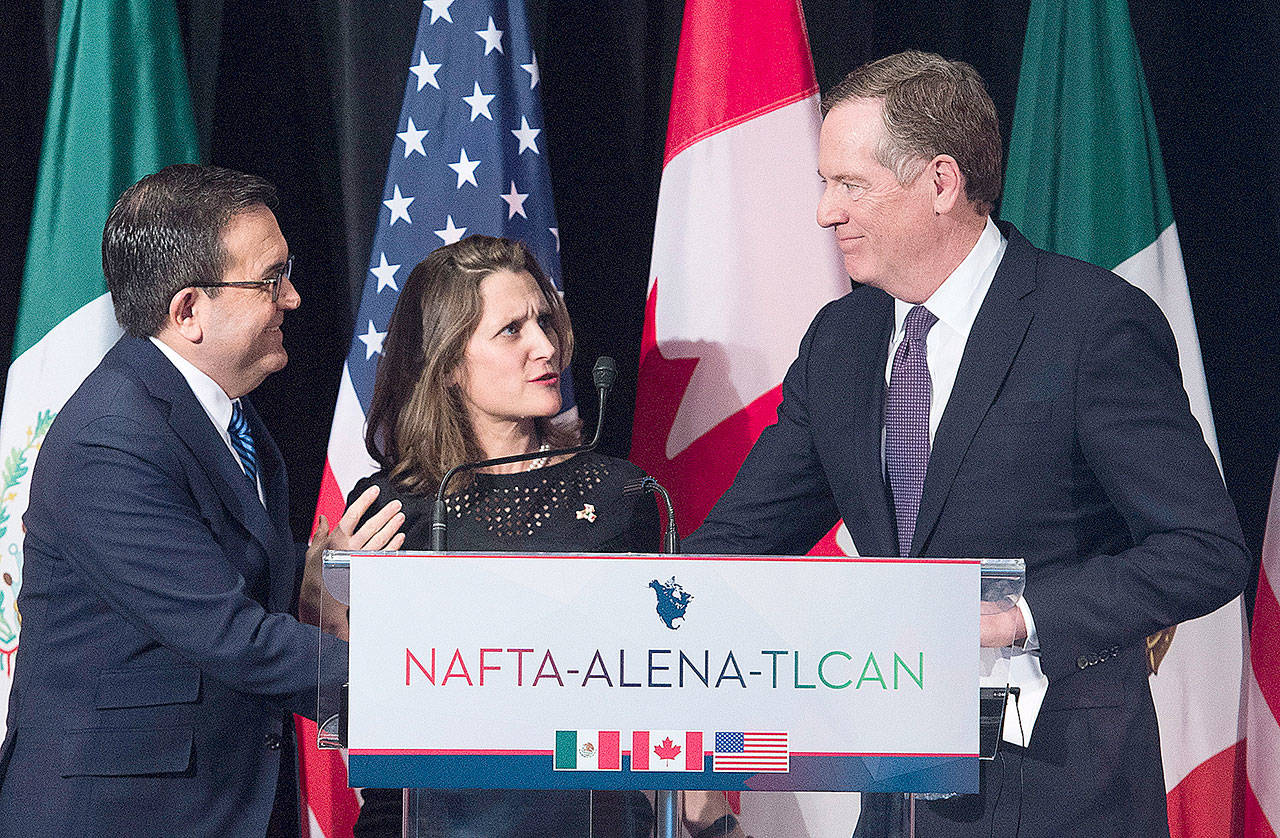By David Lynch / The Washington Post
MONTREAL — The top trade diplomats for the United States, Canada and Mexico said Monday they had made progress in talks toward a replacement for the North American Free Trade Agreement. But the three countries remain divided over several core issues that are essential to President Donald Trump’s demand to rewrite the deal to benefit U.S. workers.
While negotiators finished work on the treaty’s anti-corruption provisions and narrowed disagreements in other areas, such as customs issues and the telecommunications industry, there was no consensus on the issues that have limited the talks to a crawl since they began in August.
In their public statements Monday, the three trade officials described productive bargaining sessions. But there was evident friction below the surface cordiality.
“We believe that some progress has been made … But we are progressing very slowly,” said Robert Lighthizer, the U.S. trade representative, who spoke alongside Chrystia Freeland, Canada’s foreign affairs minister and Mexican Secretary of Economy Ildefonso Guajardo Villarreal.
Lighthizer and Freeland squabbled over the correct figures to measure U.S.-Canadian trade with Freeland at one point citing numbers from the U.S. Commerce Department to demonstrate that the bilateral relationship is balanced, despite U.S. claims of a tilt in Canada’s favor.
Lighthizer, meanwhile, dismissed a Canadian compromise proposal on the auto industry, saying that it would lead to less North American content rather than more. “This is the opposite of what we’re trying to do, he said.
He also assailed Canada for filing a recent World Trade Organization complaint over U.S. trade remedies, calling it “frivolous” and “spiteful.”
The continuing disputes make it all but certain that the talks will continue past a March 31 deadline. As a result, the president will seek an extension of his “fast track” negotiating authority, Lighthizer said.
The White House decision reflects the delays in reaching a new North American accord as well as the president’s desire to secure additional trade pacts in direct negotiations with individual countries. Under the “fast track” process, Congress is barred from amending a trade treaty submitted by the president. Lawmakers can only vote to approve or reject the entire deal.
The negotiations are aimed at overhauling the 24-year old NAFTA accord, which Trump has blasted as “a bad joke” and repeatedly threatened to quit. The U.S. is seeking concessions from Mexico and Canada aimed at regaining lost American manufacturing jobs.
Canadian and Mexican officials are determined to prevent disruptions of an integrated market of $21 trillion and 480 million consumers. “Our job is not to weaken North American competitiveness. It is to strengthen it,” said Freeland.
Speaking later to reporters, Lighthizer said that the president is following the talks “very closely.” Lighthizer said there is “huge support” in Congress for extending Trump’s negotiating authority.
The president in recent weeks has heard from an array of Republican senators and industry representatives, who fear he will follow through on his threats to kill the agreement. Up to 1.8 million jobs would be lost if the accord falls apart, according to a study by the Business Roundtable, which represents chief executives from companies such as MasterCard, Johnson & Johnson and CVS Health. Farm groups also are worried that their customers in Mexico will turn to other suppliers amid continued uncertainty over North American trade rules.
“I don’t think the president’s views have changed at all. If we can get a good agreement, we should have one,” he added.
Lighthizer said the negotiators have not considered pausing the talks after March 31 to avoid conflicting with the run-up to the July 1 Mexican presidential election.
The three sides will meet again in Mexico in late February, probably on the 24th. Lighthizer said the U.S. would seek “major breakthroughs” before the next round and would engage “urgently” with its trading partners.
“You’ll know between now and then whether this is something that’s going to be on a fairly short track or on a longer track,” he said.
The trading partners remain far apart over several U.S. proposals on the rules governing the auto industry, government procurement and a sunset clause that would kill the agreement after five years unless it were reauthorized by all three nations.
The sixth round of talks followed U.S. complaints that its negotiating partners had not adequately responded to several proposals for what U.S. officials call “rebalancing” the deal in favor of American workers by removing incentives for offshoring and encouraging the use of U.S. steel and aluminum.
One focus of the latest sessions were the “rules of origin” that determine which vehicles are allowed to move duty-free among the three countries. The current treaty requires that 62.5 percent of a vehicle’s components originate in North America. The U.S. wants to increase that to 85 percent and establish a separate requirement that 50 percent of the parts come from American plants.
Both Mexico and Canada called the idea unworkable last year when the U.S. first advanced it, saying it would disrupt supply chains and encourage automakers to move production to Asia rather than comply.
A dismissive Canadian rejoinder to the U.S. plan irritated Lighthizer. But at this round Canadian officials sought to mollify the U.S. by proposing the inclusion of the intellectual property reflected in the vehicle., an idea that Lighthizer disparaged as vague and ineffective,
Negotiators also discussed the U.S. proposal to amend the investor-state dispute settlement system, sanitary measures, customs issues and trade in telecommunications and financial services.
The three countries remain far from a complete agreement. But after appearing to teeter on the abyss, the talks appear to have settled into a traditional negotiating pattern of give-and-take.
“There’s just an air of optimism,” Rep. Dave Reichert, the Republican chairman of the House trade subcommittee, said Sunday after meeting with Lighthizer.
Talk to us
> Give us your news tips.
> Send us a letter to the editor.
> More Herald contact information.

























